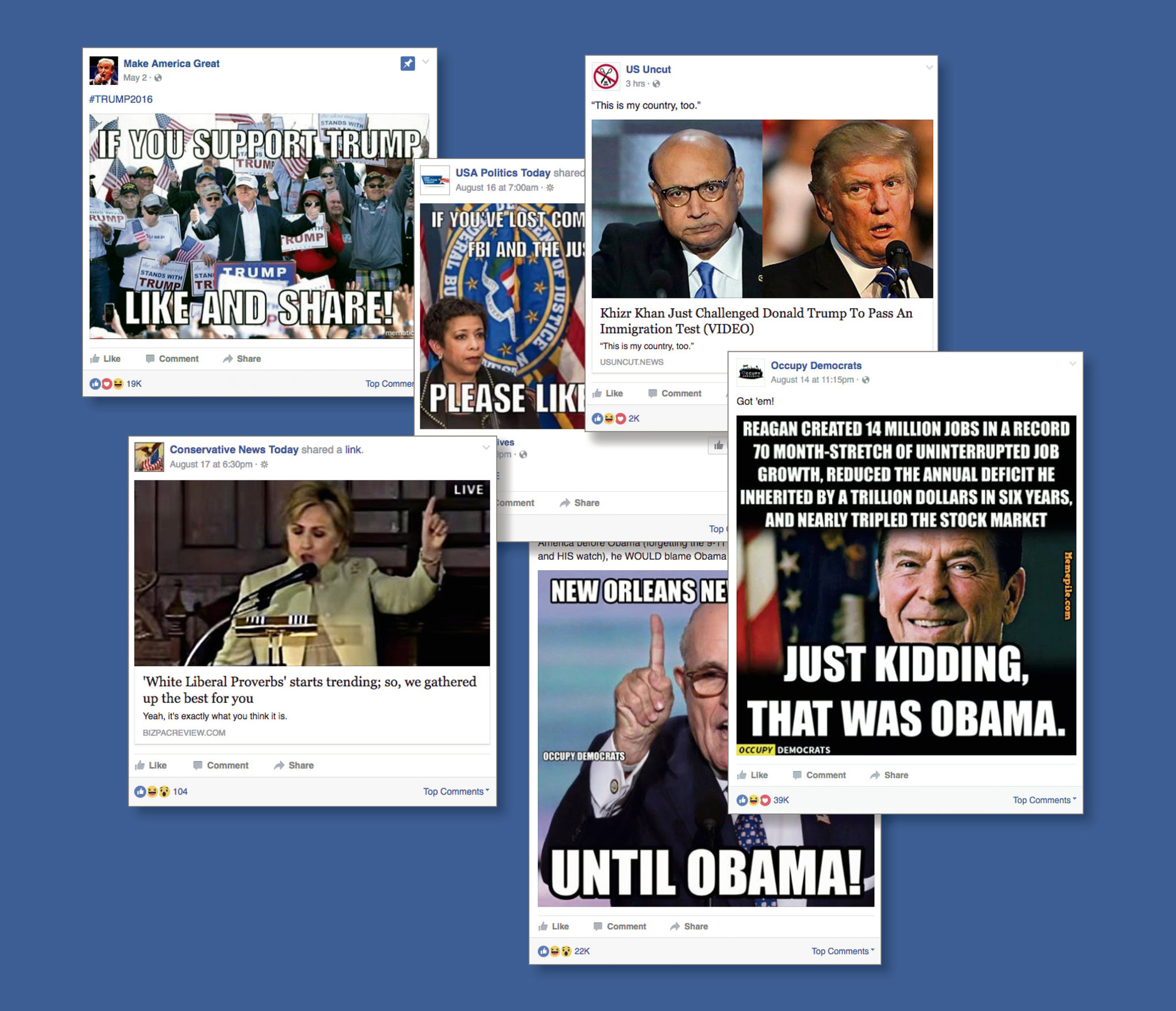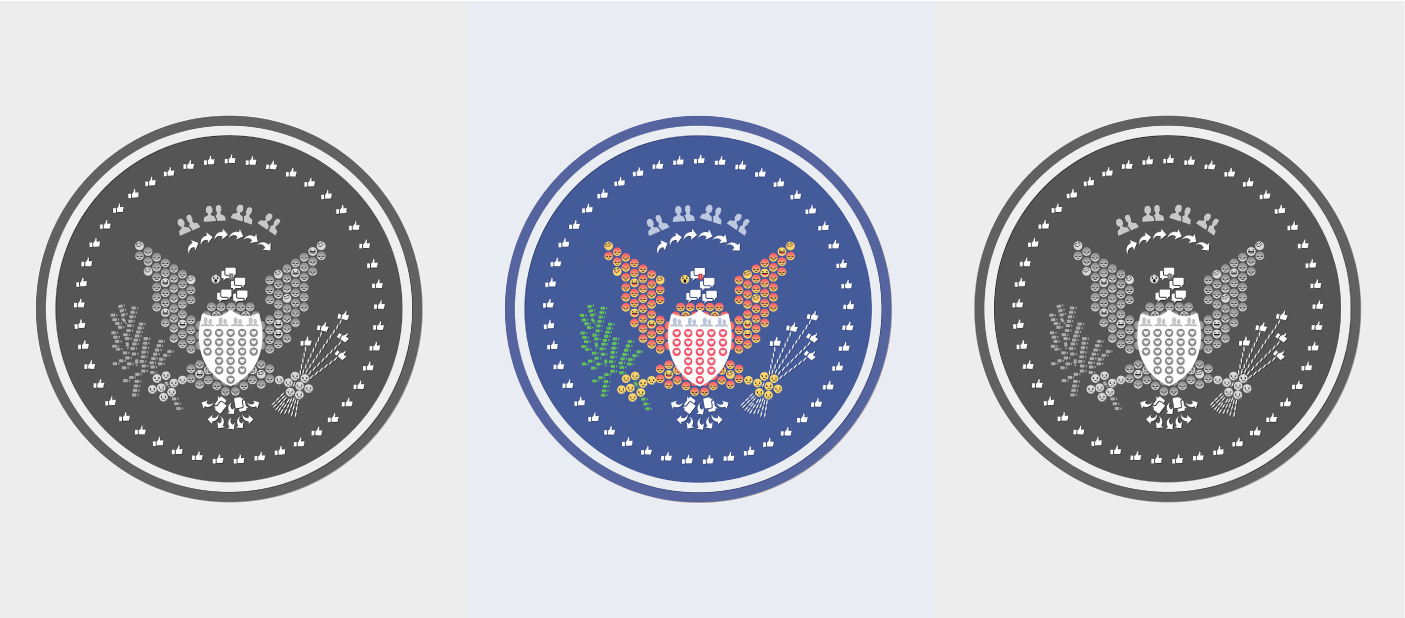How the NYT’s John Herrman pulled back the curtain on fake news
John Herrman, a David Carr fellow at The New York Times, has been reporting on the emergence of what has only recently been broadly defined as “fake news.”
Herrman’s recent piece in The New York Times Magazine, “Inside Facebook’s (Totally Insane, Unintentionally Gigantic, Hyperpartisan) Political-Media Machine,” explored the Facebook-first media sites that seemingly dominate our newsfeeds, regardless of which side of the political aisle you stand – or click.
Herrman spoke with Storybench about what he found out and what went into the reporting. The interview has been edited for clarity and space.
You’ve been on the Facebook beat for quite some time. What got you on that beat in the first place?
I got my start in gadget blogging, more or less and then branched out from there into different sorts of tech reporting. Then at Buzzfeed in 2012, working with my colleague Matt Buchanan, we became sort of fixated on the way Twitter and Facebook and various other social platforms were sort of changing under our feet. These were things that more and more people were using — in our world, everyone was using, to some extent. We started to become obsessed with the idea that relatively small changes, or changes that might seem like little feature updates at the time, could really end up creating some pretty significant consequences.
When did you notice the hyper-partisan Facebook pages that you talk about in The New York Times Magazine piece? When did you first say, “Oh, that’s interesting or that’s more frequent than I thought it was”?
The point at which I really became obsessed with the Facebook page economy was at some point in 2014. I was doing a column for The Awl, it was called, “The Content Wars” and one of them was all about how this sort of pioneering new advocacy mixture at Upworthy had been adopted in a cheaper, faster way around Facebook. There were lots of pages that were trafficking in kind of feel-good political content, but there was a new wave of sites that were just tapping into darker things. It’s not just that inspirational narratives play well here and that those can be pretty explicitly politicized, it’s that fear works, confirming stereotypes works. People just realized that the spectrum of what functioned in this ecosystem was pretty broad. That was when I tried to run through what was out there.
At the time—there were a couple familiar names in that piece—but that was two years before the election and it was sort of a thought experiment, “What does this 2016 election look like?” [Editor-in-Chief] Ben Smith at Buzzfeed had written a sort of provocative post about how it seems plausible that in 2016 there would be this big force that confounds pollsters and took pundits, political observers, and political arbiters by surprise and that it would dawn on people, maybe too late, that a lot of this was coming from social media. So I said, “Okay. Let’s grant that this is the case. What does that look like?” The conclusion was—parts of it hold up, parts of it don’t—basically the idea was that there’s a language that’s emerging here that’s going to be very powerful. There’s going to be a lot of, I think the phrase was “dog whistling” from the news feed—there’s going to be viral swift boating.
It was sort of, “Okay, let’s just see what could happen here.” Judging from what was out from sites likes Western Journalism and Independent Journal Review—anyway a handful of early ones, they were already doing this. They were writing really inflammatory stuff about police shootings, about ISIS and making some telling and extreme jumps to broad generalizations about Islam. It was all there. It was just unclear what the trajectory was. Because this post was based on Ben Smith’s projection of continued growth and power for these platforms, it was sort of like, “Well, this is going to be crazy and just in time to elect the next president.” So, that was where we were coming from then and I just kept an eye on these things.
The Times story came out of conversations with editors who—they said, “Let’s revisit this subject in this post.” I was really happy to do that because I had been keeping track of a lot of the pages. Around then, I had started using Crowdtangle to analyze page activity in a broader way, which was something I hadn’t really been able to do before. I had always loved using the Facebook analytics tools, to the extent that they were available. But they were pretty limited and Crowdtangle offered some search functionality that really opened things up just enough to get this reporting started. I could sit down and search for “Donald Trump” or “Hillary Clinton” or “Election” or “Immigration” or “Trade” and get a list of the pages whose posts were producing the most engagement around that subject, over a specified period of time.
Not enough to draw strong conclusions, but more than enough to start getting in touch with people—to know where to look and to broadly get a sense that these pages, which are an imperfect proxy for what’s really going on all over Facebook and are a tiny sliver of the overall activity on the platform—it was enough to sort of say, “these are huge on their own.” If we imagine them to be related to the larger Facebook ecosystem in the way that we imagine professional media pages, politician pages, etc., then these must be huge and what they represent must be even bigger. That was how it all ended up.

Mark Zuckerberg says that these types of sites make up one percent of the content on Facebook while 99 percent is authentic. I don’t understand the difference there. What do you think?
The way that Facebook tends to think about these things before scrutiny and tends to respond to them before they’ve really had to martial resources and people to think about this stuff, is in a really legalistic, narrow way. Back in 2013, when they were talking about clickbait and “low quality content,” I remember lots of people saying, “Oh, they’re finally going to crack down on these viral websites and all the new viral publishers are going to be screwed.” You would talk to [Facebook] and realize that no, when they talk about clickbait, they mean a link that takes you to an outside domain that contains nothing, but what was already embedded in the link—it’s a link to an image surrounded by ads.
It would be identified, in their terms, as clickbait by some observed behaviors; people clicking and then quickly leaving the page, which they could see, or negative sentiment in the comments—something like that. So, everyone’s reading this from the consumer and media perspective and thinking, “Wow, they’re really taking this seriously.” But then internally [Facebook’s] like, “No. No. We just have an adjacent, spammy problem.”
So when [Zuckerberg’s] talking about fake news, now, I really just sort of assumed he was like, “Well, the amount of things that are shared here is so high and the things that are intentional fabrications, that are transparently, without any examination intended to deceive that’s a very small portion.” That’s like a really, really broad view of the platform and has very little to say about like— they were the words of someone who hadn’t really wrestled with the scope of the issue or with the real substance of the issue, yet.
He was also using the narrowest possible definition of fake news, which to be fair is the one that initial report that Buzzfeed published used as well, is that these are basically scam sites. When I spent a few months talking to these different page operators, there were elements of that, but we kind of went out of our way—we were conscious of the language we used to describe them, because they were not just making stuff up. They were very consciously shaping narrative and speaking to audiences. The veracity of the things that they were publishing was second to that, but they understood that it helped them to root the posts in some sort of semblance of credibility. It’s not to say that most of these folks are credible, it’s just that they are doing Fox News times ten—very motivated, partisan-first stuff.
How did you get these site operators to pull back the curtain?
We have to remember that this was before these sites were getting a ton of scrutiny, so they were largely surprised to be contacted and eager to tell their stories. The left leaning pages that I spoke to were easier to get in touch with. They were more openly motivated by politics, broadly speaking. They saw what they were doing as advocacy and activism, and it’s clear in the way that they do things that that’s true. They were making money, but less eager to talk about it. They weren’t as openly profit motivated. They were excited about building big audiences. They’re thinking, “We’re embryonic media companies and we’re gaining traction.” The other pages—some of the conservative pages were similar. To contact people, I would run these searches on Crowdtangle and compare them and pulled together about a dozen or so spreadsheets of the pages that were producing engagement around major political topics, at the time. I would check to see which pages appear on lots of lists or which ones appeared really prominently. So, if a page was consistently in the top 20 most engaged pages on Facebook for say Hillary Clinton, I’d be like, “I need to talk to that page.”
What I ended up with was kind of a long list and I just started going down it and trying to see whom I could get in touch with. Some of the more above-board pages had contact information and they answered their emails or they knew each other; sometimes one page would connect me to another page, and so on. A lot of the other pages—the ones where authorship was unclear, the ones that maybe had a name that was different from the site they were clearly working with, the ones that bore the hallmark marketing world traits—they were harder to find.
Also, a lot of them ended up being not necessarily connected with other media companies or media operations. I talked to a lot—they often weren’t the highest ranking ones, but they would be associated with non-profits or PACs or they would be pages that sort of had large, organic audiences, but in many cases seemed to have probably done a lot of audience acquisition and were spending money from undisclosed donors to advance—these were often pages that had grown out of the Tea Party movement. So, there was a lot of residual apparatus from that, which was honestly less important than the newer stuff. The marketing world people were harder to get in touch with—I had kind of a low success rate. You track down domain registrations. You find all the sites that they consistently link to and try to contact people through that. Honestly, you do a lot of Facebook messaging. In each of these pages, I would be averaging 7 or 8 attempts to contact and then one of them would get back and I’d get an email back from a different email address and I’d have to ask which page they were talking about. Like, there’s no identifying information here.
I had quite a few conversations with people who were like, “I don’t really want to go on record about this, but we can talk on background.” That was helpful. There was a lot of hesitation about going on record from a lot of people who sort of understood this as a political story. To your question about people disclosing finances and stuff likes that: the people who were the most open were the ones who were coming at this from not necessarily a pure marketing perspective, but who had roots in that world. So, if you look at the Make America Great Again—“Make America Great Today,” it’s got a different name, now—that page and the network of pages, not the Liberty Alliance, but Terry Littlepage, Terry Littlepage’s network, they were pretty clearly… I mean, they were pretty open about coming from a marketing background, running pages because they represented audience opportunities.
The language they used was very different from the other people I talked to. They were pretty open about what they were doing because they were excited about how good a source of engagement Donald Trump was in this sort of abstract and fascinating way.
The people you talked to say they really wanted engagement. Was that out of a political passion or was that more financially motivated?
My sense, in the course of reporting, was that the two would converge. Some people were coming from a purely passionate political place and those people would either be less eager to talk about money or more likely just making less money or not making any money at all. But anyone running a large page—it’s very easy to monetize. You just sign up for a RevContent module and plug it in. People aren’t leaving money on the table.
So even the people who were coming at this from a pure marketing perspective, they sort of drifted towards politics; people coming at it from a politics, sort of incorporated commerce. It did feel like there was an industry ecosystem developing, where all of those things, in the process of becoming businesses, become kind of muddled. But yeah, even the people who were super open about how much money they were making and about the methods they were using to make that money, which I think to readers would have come across as sort of shocking, like the hiring of contractors to aggregate content from other pages.
As time went on and the election grew closer, I just got the sense that the political motivations grew the success of the page, the excitement of the campaign, and the sense of mounting momentum—it all just sort of blurred the lines. So by the end, I think, maybe people who in the beginning were thinking, “I’m getting a great deal here. I’m discovering some great marketing thing,” came to realize that they were also now part of this political moment and may as well embrace it, or maybe that’s even too distant. I think it’s probably more like, “This is part of what I’m doing, now.”
Do you think that now that the election is over, we’re going to see those sites fade away, or are they here to stay?
I can’t make any predications about that. There are too many variables. Some of the energy, all other things equal is, I’m sure gone and I’d like to revisit some of those numbers, now. I’m reminded of when, during the campaign, Bernie Sanders chances started to diminish, the pages that had been vigorously supporting him and reaping huge audience benefits from that were pretty profoundly destabilized. If you were doing a few stories a day about Bernie Sanders, or using Bernie Sanders’ words, or whatever, and they were really breaking through, and then suddenly you don’t have that, you’ve really got to rethink your strategy.
A lot of the pages did and there was still a lot of energy around the election and they got back into it. As the story sort of suggested, and as we saw later, a lot of them became just sort of Anti-Trump pages. I’m sure that there’s plenty of energy for that. There’s a different hunger now, and I’m not sure which pages will be able to serve it and which ones won’t. Also, the ecosystem I do think will change.
I think Facebook’s attitude towards this kind of stuff could change in any number of ways, especially now that they’re such a big part of the conversation. In a much broader sense, as part of the big Facebook narrative, the external link economy has been consistently marginalized quarter by quarter by quarter within Facebook.
The election brought this link economy to the fore and is certainly shining a lot of light on it, but I think that is a brief interruption in the previously scheduled programming, which is Facebook bringing stuff in, formalizing various types of media—seeing how far it should go with that and testing the limits of co-opting external media.
So, I don’t think that story is nearly done and I think that the space in which these pages operate is kind of threatened. I think the things around these pages, the kind of endless super partisan content on Facebook, whether it’s videos or made up content—it’s very hard to get a sense of the scale of that, but that is still very central to what Facebook is. It’s hard to know where to look and it’s hard to make any broad predictions about what happens now with these pages, especially with individual pages. It’s a big, giant confusing mess, now.
What was the reaction after your piece was published in late August? What was the reaction to it? From readers or people, in general?
It would be interesting to go back and try to dig that up. [It was] generally positive. I think people felt like they were getting a look at something that they sensed was big, but that was hard to sort of see all at once. That was our goal, I guess. To sort of say, “Look, here’s some background. Here is an attempt at some explanation for this thing that you’re probably feeling as you log into Facebook, and that is, in our estimation, even bigger than it seems to you from your perspective.” I think we accomplished that mission and people responded well to that.
A lot of people were like shocked, but then dismissive of a lot of these pages in a way that I felt was, in some ways warranted and, in other ways, counter- productive. A lot of people would read the headlines we included, which we selected because they were often striking or jarring. But they would read them and be like, “Wow. This is just a bunch of garbage spam.” But the assumption seemed to be that they weren’t a part of a real political conversation. Part of that was, I think, a broader sense among liberals that a Trump victory was scarcely possible and so all of this stuff was morbidly fascinating, but not urgent.
I do think this did help make it seem a little more real to people and the response was mixed along political lines, but not in a super predictable way. Some more progressive readers were upset at the characterization of the left leaning pages and mostly with the implicit comparison of those pages to some of the right leaning pages that were more openly about just making money. I think we included both, but we made distinctions between what each page was doing and what others were doing, including in the same political category. There were right-wing pages that were clearly coming from a different place than other right-wing pages. The page operators themselves were—some just sort of went silent, some were upset; at least one had their page shut down, but then reinstated and blamed the story for that.
The site got shut down?
Temporarily. But it’s completely plausible that the story resulted in some frantic, takedown thing by Facebook. We never heard back about that and the page was reinstated. These pages get suspended and reinstated pretty frequently.
What’s your outlook on all of this stuff? Are you optimistic or is your outlook more grim?
I don’t know. My general stance is that people keep underestimating these things and keep failing to imagine how profound it is for media distribution to just change.
But really it’s a medium change, even if it doesn’t necessarily feel like it. I think it’s really hard to overstate how big of a deal that is. Even if you take Mark Zuckerberg’s broadest, most optimistic statements about connecting the world and then just try to imagine any single party or company accomplishing that goal—actually connecting the world in some new way—without, in a material way, utterly changing how that world works. So, I just feel like we keep underestimating things, and I don’t know, underestimating change…watching that change come to pass. I feel like that often feels like chaos. I don’t want to say that I’m pessimistic or optimistic—I don’t know.
You asked in your piece: “How much of what happens on a platform is a reflection of a political mood and widely held belief, simply captured in a new medium? How much of it might be created or intensified by the environment it provides?” Can you answer that?
The way we framed that, I think, was telling. On one extreme we had, “This is a pure reflection,” on the other we had, “This is where things originate.” Because of the nature of platforms, I think the answer has to lie somewhere closer to intensification. There’s plenty of individual cases where stories, narrative, moments, parts of movements might not have existed without the platform. There are plenty of others, where the platform simply provided a venue for something to really sort of multiply or explode.
When you hear economists talk about what platforms like this are, the metaphor that they increasingly fall back on and that the scholars of the subject stick to is that they’re engines. Again, they’re markets. They’re engines. They provide the opportunity for things to be built in a certain way. I don’t know. It’s kind of why we posed that as a question. It’s very hard to know. But we know that it’s not a top-down, simple thing and we also know that the way that a platform is designed and the way it functions and the incentives that it creates can have a profound effect on—profound determining effect on what works there and what gets amplified. That’s very hard to nail down.
Is there anything else you’d like to add?
In terms of the story, I’m glad that we did it. Thinking about the reaction, again, it was—like so many things that were published during this election it’s worthwhile to go back and read some of the pieces again and to also try to remember or excavate the reactions. That feels like an important thing to do, in general. Going back and thinking about the conversations I had with different sources and subjects, with editors, and then with people after publication—to go back and sort of relive those and to imagine having them again or to imagine them unfolding again with a stronger assumption that Donald Trump might win is a worthwhile thought exercise. I don’t think this particular story would have been that different, but I think it would have been received in a pretty different way.
On December 15th, Facebook released a new product to combat fake news and the spread of misinformation. The video below explains how to use it.
For John Herrman’s most recent take on the topic, read his New York Times article, published December 22.
- How the NYT’s John Herrman pulled back the curtain on fake news - December 29, 2016





